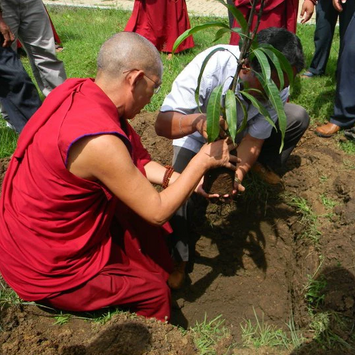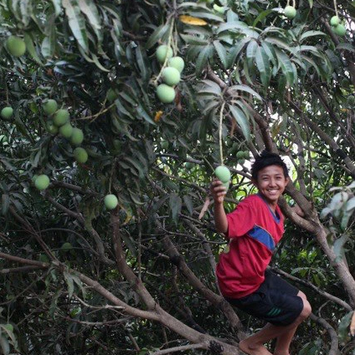Pema Ts’al Mangoes
One of the first trees in the ambitious lifetime project of planting a million mango trees
Tibetan community members have gained a lifetime of intimate experience with the land and its vicinity almost from the beginning of the Tibetan settlement in the late sixties, and they have experienced various changes to which they have had to adjust as they made it their second home away from home. They also had to learn to adjust to the change of climate and local ecology that over these four decades they as farmers have had to confront.

Envisioning possible changes in the environment and in ecology, Venerable Guru Gyaltsen has personally led the initiative to experiment with various means of finding alternative crops. One of them is to plant perennial local fruit-bearing trees—mangoes, specifically—as an alternative measure to cope with the increasing pressure of crop failure in rice, corn, and cotton. The latter are all more weather sensitive; too much or too little rainfall dramatically affects the growth of the crop compared with the perennial fruit-bearing tree. For example, in 2011 they did not get to start cultivating field crops at all. Twelve years ago, they planted close to three hundred mango trees on their monastic property. These are now bearing fruit that brought an income of USD 5,900.00—very competitive with other crops in the normal year.
Our experiment has shown that perennial fruit trees are much more reliable than the annual crops. The global and local human activities have affected the natural environment and the lives of the community in three major areas: a) consistent failures in crops linked to untimely rainfalls droughts or excessive rainfalls (this year we had an overwhelming rainfall that hindered cultivation of the annual crop); b) the depletion of underground water reserve; and c) increase of percentage of fallow lands to approximately 20% of total cultivable land due to farmer attrition. Pema Ts’al School intends to contribute toward the replenishment of the underground water reserve, revegetate fallow lands, reinvigorate the natural surroundings, and empower locals toward better and alternative self-sustaining crops. We propose to do so by introducing mango trees that not only have local environmental benefits but also have a far better economic viability for the local community members than their annual crops of rice and corn.
"Plant something in your heart, in your front yard or back yard, or just about anywhere appropriate, then nurture it. It is sure to grow."

Harvest
Alphonse in mango terminology means the best of the thousand species of mangoes in the world. That is what you see in the photo above. These are the first few mangoes of the season plucked from the mango grove that teachers and children of Pema Ts'al School planted in their backyard more than ten years ago. This year, with support from Yeshe Dorjee Foundation and Dean Willard and his family, Lama Guru Gyaltsen and his children planted exactly 320 mango trees on their five acres of land. Better yet, this is part of the one million trees we aspire to plant over the course of time.


Thank you
We thank Dean Willard and his family for making this pilot program of planting mango trees possible, and we—the teachers, boys, girls, monks, and a nun—in gratitude offer our pure heartfelt prayers for their good health, longevity, and happiness.
Dean Willard (right) with daughter Emily (left)














